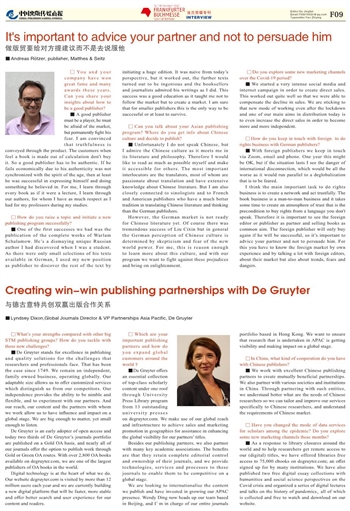■Andreas Rotzer, publisher, Matthes & Seitz
□You and your company have won great fame and many awards these years. Can you share your insights about how to be a good publisher?
■A good publisher must be a player, he must be afraid of the market, but permanently fght his fear. I am convinced that truthfulness is conveyed through the product. The customers when feel a book is made out of calculation don't buy it. So a good publisher has to be authentic. If he fails economically due to his authenticity was not synchronized with the spirit of the age, then at least he was successful in expressing himself and doing something he believed in. For me, I learn through every book as if it were a lecture, I learn through our authors, for whom I have as much respect as I had for my professors during my studies.
□How do you raise a topic and initiate a new publishing program successfully?
■One of the first successes we had was the publication of the complete works of Warlam Schalamow. He’s a dismaying unique Russian author I had discovered when I was a student. As there were only small selections of his texts available in German, I used my new position as publisher to discover the rest of the text by initiating a huge edition. It was naive from today’s perspective, but it worked out, the further texts turned out to be ingenious and the booksellers and journalists admired his writings as I did. This success was a good education as it taught me not to follow the market but to create a market. I am sure that for smaller publishers this is the only way to be successful or at least to survive.
□Can you talk about your Asian publishing program? Where do you get info about Chinese culture and decide to publish?
■Unfortunately I do not speak Chinese, but I admire the Chinese culture as it meets me in its literature and philosophy. Therefore I would like to read as much as possible myself and make it accessible for others. The most important interlocutors are the translators, most of whom are passionate about translation and have extensive knowledge about Chinese literature. But I am also closely connected to sinologists and to French and American publishers who have a much better tradition in translating Chinese literature and thinking than the German publishers.
However, the German market is not ready for Chinese literature yet. Of course there was tremendous success of Liu Cixin but in general the German perception of Chinese culture is determined by skepticism and fear of the new world power. For me, this is reason enough to learn more about this culture, and with our program we want to fight against these prejudices and bring on enlightenment.
□Do you explore some new marketing channels over the Covid-19 period?
■We started a very intense social media and internet campaign in order to create direct sales. This worked out quite well so that we were able to compensate the decline in sales. We are sticking to that new mode of working even after the lockdown and one of our main aims in distribution today is to even increase the direct sales in order to become more and more independent.
□How do you keep in touch with foreign to do rights business with German publishers?
■With foreign publishers we keep in touch via Zoom, email and phone. One year this might be OK, but if the situation lasts I see the danger of international disconnection, which would be all the worse as it would run parallel to a deglobalization that is to be feared.
I think the main important task to do rights business is to create a network and act trustfully. The book business is a man-to-man business and it takes some time to create an atmosphere of trust that is the precondition to buy rights from a language you don't speak. Therefore it is important to see the foreign editor or publisher as partner and selling books as common aim. The foreign publisher will only buy again if he will be successful, so it’s important to advice your partner and not to persuade him. For this you have to know the foreign market by own experience and by talking a lot with foreign editors, about their market but also about trends, fears and dangers.



